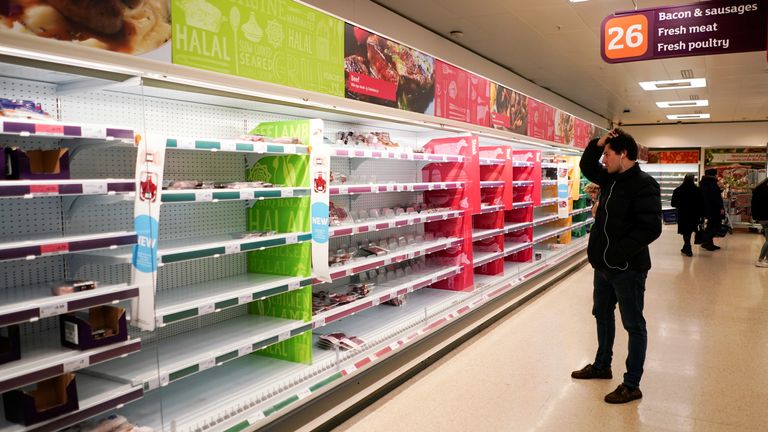Business groups have been left “frustrated” after the business secretary rejected requests to loosen Brexit immigration rules to ease the supply chain crisis, telling companies to hire UK-based workers instead.
Businesses across multiple sectors are struggling to meet customer demand as a consequence of labour shortages, particularly in haulage where there is a shortfall of an estimated 100,000 HGV drivers.
The industry says this is a consequence of Brexit and the coronavirus pandemic. EU drivers now require a visa to work in the UK, but are not included on the government’s shortage occupation list and do not qualify for their definition of skilled workers.
Image: Britain is grappling with a shortage of HGV drivers, now estimated to stand at around 100,000Many returned home during the pandemic and have not returned, and COVID also saw the suspension of driver testing, leaving a backlog of several thousand.
Nando’s, McDonald’s, and KFC are among the companies that have reported product shortages as a consequence in recent weeks, while Tesco, Amazon, and John Lewis are offering four-figure joining bonuses to drivers.
AdvertisementLogistics UK and the British Retail Consortium wrote to Business Secretary Kwasi Kwarteng last week, urging the government to help ease the immediate challenges by granting temporary visas to EU drivers.
In a response, seen by Sky News, Mr Kwarteng says HGV drivers are not sufficiently skilled to meet visa requirements and companies should focus on training and recruiting British staff.
More on Brexit Brexit: More than 58,000 apply to stay in UK after deadline for EU Settlement Scheme Operation Brock: Lorry controls to avoid post-Brexit disruption around Port of Dover in Kent to be used to manage future issues Northern Ireland Protocol: ‘We will not renegotiate,’ Ursula von der Leyen tells Boris Johnson after UK demands changes to key part of Brexit deal Boris Johnson’s Brexit gamble: Sit back and hope the EU becomes the bad cop Brexit: UK calls for ‘significant changes’ to Northern Ireland Protocol – but EU says no to renegotiation Dominic Raab says EU Commission ‘seeks to undermine UK’s sovereignty’ over Gibraltar with new negotiating proposals“The government recognise that the UK labour market has changed dramatically due to the economic impacts and measures necessary to tackle COVID-19, and I realise that by adding HGV drivers to the shortage occupation list, this could provide a short-term, temporary solution,” he said.
“However, many UK-based workers now face an uncertain future and need to find new employment opportunities. I am sure you would agree on the importance of utilising the strength of our domestic workforce, and how our migration policies need to be considered alongside our strategies to ensure UK-based workers are better able to secure decent employment opportunities.”
Image: The business secretary Kwasi Kwarteng has asked employers to invest in UK workersLogistics UK said the government’s position means driver shortages will continue well into 2022.
“Logistics UK is frustrated with the government’s decision to reject the logistics industry’s calls for temporary visas to be made available for EU HGV drivers as a short-term solution while new domestic drivers are recruited, trained and tested,” said Alex Veitch, general manager of public policy.
“While these new domestic drivers are trained and qualify into the workforce, which can take up to nine months, and DVSA works through its backlog of outstanding HGV driver tests – which we estimate could take until early 2022 – temporary visas made available for European workers would help to overcome the current supply chain problems experienced across the country.
“The industry needs drivers now, and we have been urging the government to replicate its temporary visa scheme, introduced for agricultural workers, for logistics to keep trucks and vans moving in the short term.”
UK food industry begs government to introduce new visa for workers as labour shortages mount
Follow the Daily podcast on Apple Podcasts, Google Podcasts, Spotify, Spreaker
The issue cuts to the heart of the Brexit debate, with supporters of leaving the European Union arguing that reducing the EU workforce would lift wages and standards for domestic workers.
Business counters that introducing the new regime at the peak of a pandemic has unnecessarily damaged their ability to meet customer demand.
